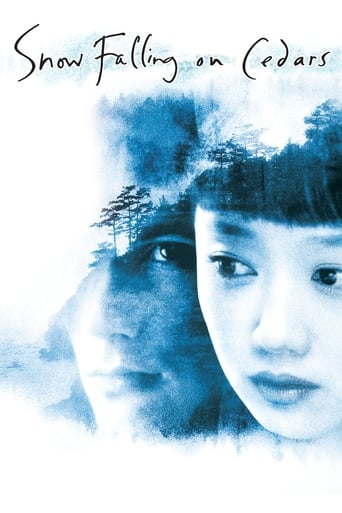SnoopyStyle
It's 1950s Washington State. Fisherman Carl Heine's body is found. Japanese fisherman Kabuo Miyamoto is accused of the murder. Sheriff Art Moran (Richard Jenkins) and prosecutor Alvin Hooks (James Rebhorn) lead the prosecution. Nels Gudmundsson (Max von Sydow) is the defense lawyer. Judge Fielding (James Cromwell) presides over the court. Ishmael Chambers (Ethan Hawke) is the only reporter in this small town. He's a returning vet with only one arm who still loves Kazuo's wife Hatsue from his childhood. In flashbacks, Ishmael and Hatsue struggle against war paranoia. Ishmael's father Arthur Chambers (Sam Shepard) is hounded for supporting the Japanese in his newspaper.It's got the snowy romantic moody atmosphere. However it lives too much off of it. The murder mystery is given short shrift. While watching the movie, I kept wanting the case be presented in a coherent way. The romance, the operatic style, and the prejudice are important but they keep getting into the way of the trial and investigation. This needs a short section where Sheriff Moran explains the case against Kabuo in a neat tidy package.
e_mcvey
This movie made no sense to anyone in my house. It barely made sense to me and I read the book. Nothing in the movie tied together, major details of the story were left out. There was easy too many flashes through information that made the story. The music was good to bring you in emotionally but they weren't the same emotions the book brought about. I was very disappointed in the entire portrayal of the trial we,weren't even sure what the evidence was or how it applied to the case because it was all done behind music. And...the title is Snow Falling on Cedars and they barely talked about the storm. People were expected to put too much thought into this to make it all make sense.
desichick892
Firstly, I want to say that people who can't appreciate good cinema and obviously cannot grasp the emotionally driven yet subtle themes that make up this beautiful piece of film should not be watching it in the first place.The story is just truly incredible because it captures three mysteries and intertwines them through past and present. The novel on which this book is based is magnificent--its like a piece of artwork come alive through words. I wasn't sure how this would be shown on film but when I saw the movie I was blown away. Just like in the novel, characters are furthered and developed through their memories which interject the present. These flashbacks are clues and hints that are fed to the audience bit by bit to allow the actual plot to unravel. Reading the book may help with the understanding of some plot points but is definitely not necessary, although highly recommended.The performances in this film are unbelievable, especially Ethan Hawke who steals the show with his portrayal of Ishmael Chambers, a local reporter who is torn between love and doing the right thing. The images are breath-takingly stunning and are accompanied by the beautiful musical score of James Newton Howard, capturing the poignancy of each scene.Please disregard the low IMDb rating for this film and go watch it right now!!! I'm begging you to give it a chance! This is one of the BEST films I have ever seen and the first film that has made me cry so much. Even after I finished watching the film, its message still moved and gripped my heart: although people cannot stop things like a war or a snow storm which are inevitable and ruled by chance, they can however perform individual acts of kindness which can obliterate the world from hate, prejudice, and racism, things that are not prone to chance or circumstance. In this way, "accident rules every corner of the universe, except the chambers of the human heart."
holdie
It is a pity that one of the very few Hollywood films that deal with the plight of Japanese- Americans during WWII should, though based on a fairly good novel, descend to such extraordinary lengths to "prove" that the incarceration of innocent people is a national disgrace. You would think that an intelligent audience might be trusted to know this without having it explained to death, and that it would need none of the self-indulgent, frequently manipulative "pathos" that mars this extremely kitschy film. Some of it is good. Much of it is so mistrustful of its audience that nothing--not even the deportation of the Japanese to concentration camps--can be depicted without a heavy-handed, editorializing musical score that owes more to Karl Orff than it contributes to the dramatic situation. Some of the performances, particularly that of Sam Sheperd, are excellent. The direction, the editing, are embarrassingly derivative. Characters are either impossibly noble and likable or so unambiguously dreadful that you wonder their neighbors allowed them to go on living. There is no middle ground. Shades of gray, absent from the director's mind, are nowhere to be found in his film. Ultimately there is nothing here but a second-rate film director exhibiting his unwillingness to let the material speak for itself. The movie should be awarded a prize for the most intrusively manipulative musical score in recent film history.




